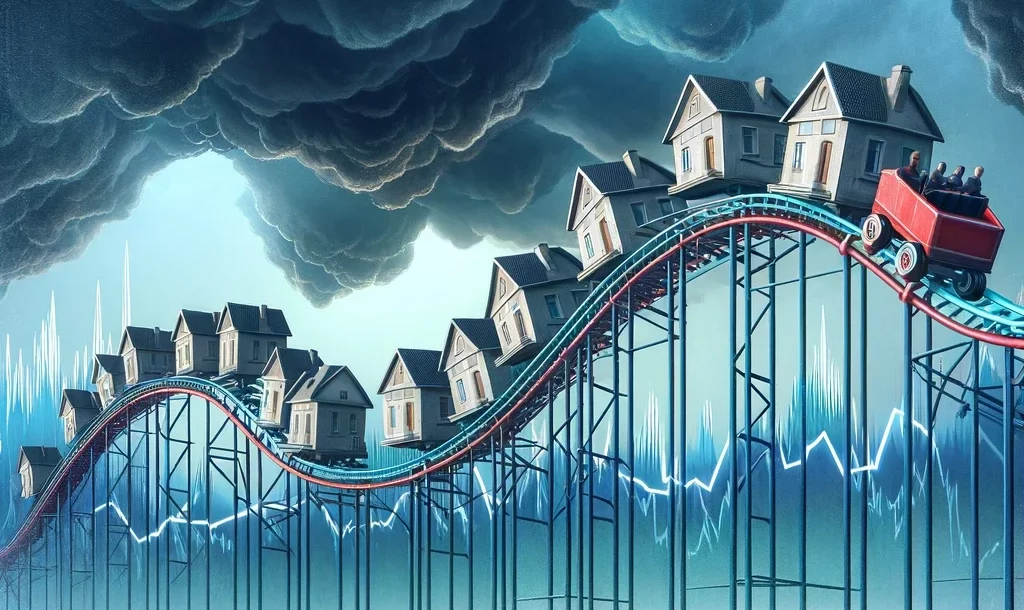
Housing markets rarely see drastic crashes without clear warning signs. What do experts forecast for 2024 based on current data? This analysis examines market indicators and crash probabilities.
Current Market Indicators and Predictions
Leading housing economists predict slowed growth but no major downturns in 2024. Signs point to moderation over crashes.
Morgan Stanley analysts forecast a plateau versus correction, citing home affordability worsening but demand still outpacing supply.
Factors Driving Housing Market Stability

Rising mortgage rates will temper demand, creating stability. Rates near 6% expected through 2024 versus 3% historically.
Steady job growth and incomes support housing demand. Overall economic health points away from a 2008-style crash triggered by systemic risks.
Regional Variations in Market Predictions
Coastal markets may see mild price declines in 2024, while Sun Belt and Mountain West regions will likely plateau. Midwest markets remain stable.
Areas with recent overbuilding and spikes in investment buying face higher correction potential. But crashes are unlikely.
Goldman Sachs’ Updated 2024 Projections
In January 2023, Goldman cut its 2024 home price forecast from +5% growth down to 0% growth. This indicates a potential plateau versus a crash.
Slower projected price growth reflects expectations for further moderation in demand as rates stay elevated.
Could a Housing Market Crash Still Occur?
A severe recession marked by mass unemployment could theoretically trigger a crash. This remains improbable barring unexpected economic shocks.
Current conditions have little resemblance to 2008 when systemic risks like lax lending standards crashed housing.
How Inflation and Recession Could Impact Housing

High inflation makes homes less affordable. But as inflation eases per projections, its downward pressure on housing may moderate.
A recession could slow price growth if unemployment spikes. But the low risks of a severe recession suggest limited impact.
Expert Analysis of a Potential Crash
Many economists see conditions that will facilitate a soft landing for housing. While risks exist, a 2008-style crash seems unlikely.
Some bearish analysts point to isolated risks, but broad consensus agrees fundamentals support stability.
Preparing for Market Uncertainty
Home sellers should moderate expectations if considering listing soon, as growth slows. Buyers may have room to negotiate as demand cools.
Avoid overextending your financial resources. Build emergency savings to weather unexpected economic shifts.
Government Policy Effects
Programs increasing housing supply could aid affordability long-term. Interest rate policy may influence buyer demand. But no major interventions are expected.
Global trends could potentially affect domestic capital flows into real estate. But current conditions overseas don’t point to major risks.
Conclusion
The housing market outlook remains cautiously optimistic for 2024 based on current expert projections. While risks such as high inflation and rising interest rates exist, the overall economic fundamentals point towards a soft landing with slowed growth rather than a devastating nation-wide crash. Regional differences will emerge, but a broad downward spiral is improbable without a severe recession – an unlikely scenario as of now.
While no guarantees exist when it comes to economic forecasting, the housing pros consensus aligns with the famous wisdom of Warren Buffett: “Be fearful when others are greedy, and greedy when others are fearful.” Current indicators point clearly away from greed and exuberance, suggesting a conservative but generally healthy path ahead for housing. Stay tuned to expert projections, but avoid irrational fearmongering or sky-is-falling panic. The prudent approach will likely be rewarded as the markets embark into 2024 and beyond.
FAQs
What are warning signs of a housing market crash?
Spikes in high-risk lending, overbuilding, and unemployment signal heightened crash risks. Current data shows stability versus excesses.
How reliable are housing market predictions?
Analyst forecasts provide informed estimates but cannot account for unexpected economic shocks that could shift trends.
Can predictions impact actual housing markets?
If consumers responds to grim predictions by sharply reducing spending, it can become somewhat self-fulfilling. But this scenario appears unlikely now.
Related Information: How To Buy Foreclosed Homes With No Money: A Strategic Guide
